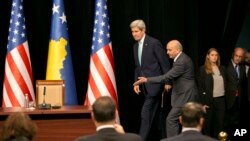U.S. Secretary of State John Kerry called on opposition lawmakers in Kosovo on Wednesday to stop setting off tear gas in parliament, and on the young country to combat corruption, Islamic radicalism and ethnic division.
In the Balkans for the first time as secretary of state, Kerry's brief stop in Kosovo underscored Western concern over the slow pace of progress 16 years after a U.S.-led NATO air war set the former Serbian province on the road to independence.
The country of 1.8 million people - mainly ethnic Albanians - faces a deepening political crisis over relations with former master Serbia, against a backdrop of widespread frustration at a lack of progress on democracy, corruption and Western integration.
Rocked by riots
Kosovo has been rocked by riots and opposition MPs have disrupted parliament's work for two months by releasing tear gas in the chamber, angry over a deal to grant ethnic Serbs greater local powers and allow them some funding from Belgrade. The opposition believes this could threaten Kosovo's independence.
After meeting Kosovo's Prime Minister Isa Mustafa at the Pristina airport, Kerry said parliament should be "a shrine to democracy, a place of reverence, of respect, that is not the place for tear gas and it is not the place for intimidation."
"All parties need to renounce the use of violence in public life, and commit to engaging with each other peacefully and constructively."
Kerry praised the proposed agreement with Serbia, leveraging the popularity enjoyed by the United States in Kosovo to help build support for the deal.
"Make no mistake: we would not support any agreement that would threaten the sovereignty, or the security, or the independence of Kosovo," he said.
Kosovo broke away from Serbia in 1999 when the United States led an 11-week NATO bombing campaign to halt the killing and expulsion of ethnic Albanian civilians by Serbian security forces fighting a two-year counter-insurgency war.
Kosovo declared independence in 2008.
Radicalization risk
The mainly Muslim but overwhelmingly secular country remains staunchly pro-American, and Kerry was met at the airport with red, white and blue banners that said "Welcome Secretary John Kerry" and greeted by a 50-man honor guard.
However, there are concerns in the West over the risk of radicalization among disaffected and jobless young Kosovars. At least 200 of them are believed to have joined Islamist militants in Syria and Iraq.
While praising government efforts to tackle militancy, Kerry said more needed to be done by "all of us".
Kerry then flew to Belgrade, where he met Serbian Prime Minister Aleksandar Vucic, a former ultranationalist who was information minister in the late 1990s when former president Slobodan Milosevic led Serbia into war with NATO over Kosovo.
Standing side by side in Belgrade, Kerry praised Vucic, who has rebranded himself as a pro-Western reformer, for opening talks with Kosovo and trying "to put the past in the past."





